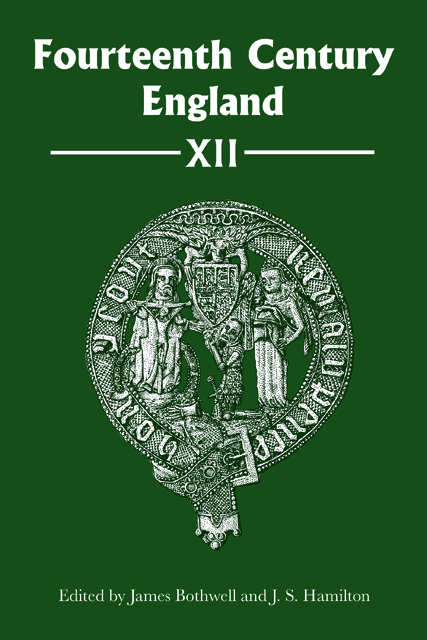Book contents
- Frontmatter
- Contents
- List of Illustrations
- List of Contributors
- Preface
- Abbreviations
- The King’s Confessors and the Royal Conscience in Late Medieval England
- ‘Such maintenance as …’: Corrodies of the Crown
- ‘Vos maisons sount pris al eops le counte’: Walter Bedwyn, Treasurer of York, and the Return of Piers Gaveston
- The Deposition of Edward II: The Kenilworth Embassies
- The English Parliament and the Trial of the ‘Peers of the Land’ in Henry of Lancaster’s Revolt (1328–29): The Origins of a Privilege
- A Brotherhood Uncovered: Investigating the Knightly Following of Thomas Beauchamp, earl of Warwick, 1329–69
- The Black Death and Clerical Prospects in England
- The Last of the Duketti? Richard II, Henry of Monmouth and the House of Lancaster
- Confusion Confounded? The Contrasting Military Fortunes of Sir William Neville (d. c.1391) and Sir William Neville of Pickhill and Rolleston (d. c.1420)
The Black Death and Clerical Prospects in England
Published online by Cambridge University Press: 11 January 2023
- Frontmatter
- Contents
- List of Illustrations
- List of Contributors
- Preface
- Abbreviations
- The King’s Confessors and the Royal Conscience in Late Medieval England
- ‘Such maintenance as …’: Corrodies of the Crown
- ‘Vos maisons sount pris al eops le counte’: Walter Bedwyn, Treasurer of York, and the Return of Piers Gaveston
- The Deposition of Edward II: The Kenilworth Embassies
- The English Parliament and the Trial of the ‘Peers of the Land’ in Henry of Lancaster’s Revolt (1328–29): The Origins of a Privilege
- A Brotherhood Uncovered: Investigating the Knightly Following of Thomas Beauchamp, earl of Warwick, 1329–69
- The Black Death and Clerical Prospects in England
- The Last of the Duketti? Richard II, Henry of Monmouth and the House of Lancaster
- Confusion Confounded? The Contrasting Military Fortunes of Sir William Neville (d. c.1391) and Sir William Neville of Pickhill and Rolleston (d. c.1420)
Summary
Approximately 40–50 per cent of the 9,000–10,000 parochial beneficed clergy in England died during the Black Death. Records of the institutions of the clergy who succeeded them in their rectories and vicarages have been used extensively for studying the progress of the plague and the mortality it caused. The present study uses these records to examine the extent to which the clergy who succeeded the deceased were similar to or differed from their predecessors and to assess whether the plague caused an immediate and significant change in the filling of benefices and the character of the beneficed clergy. It is focused on five dioceses in the midlands and north of England – Coventry and Lichfield, Hereford, Lincoln, Worcester and York – but comparisons will be drawn with other dioceses where this is helpful.
Filling Vacant Benefices
A benefice which became vacant was in the gift of a patron, who must present a new incumbent to the bishop within six months, failing which the bishop could collate the benefice to a man of his own choice through lapse of time. Parochial benefices were, with certain exceptions, either rectories or vicarages. When a benefice fell vacant, the patron presented a clerk to the bishop, who normally ordered an enquiry into the benefice and the person presented. On receiving a satisfactory report the bishop admitted and instituted the clerk to the benefice and issued a mandate for his induction. Although details of the enquiry are very rarely given, the person presented seems hardly ever to have been refused institution, at least by the mid-fourteenth century.
The whole process seems normally to have been carried out expeditiously. For one diocese, Coventry and Lichfield, we have records of the time lapse between the start of the vacancy and the institution of the new incumbent. When the vacancy was caused by the death of the incumbent and therefore often unexpected, between 1322 and 1348 38 per cent of benefices were filled within twenty days, 38 per cent in twenty-one to fifty days, and 13 per cent in fifty-one to ninety days, with only 12 per cent taking more than ninety days. The median interval was twenty-six days. Episcopal collations ‘by lapse’ occurred on no more than seven occasions.
- Type
- Chapter
- Information
- Fourteenth Century England XII , pp. 129 - 150Publisher: Boydell & BrewerPrint publication year: 2022



